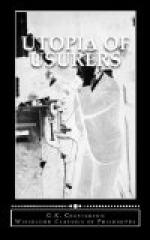The roof could not be mended, or, at least, it could not be mended much, without upsetting the capitalist balance, or, rather, disproportion in society; for a man with a roof is a man with a house, and to that extent his house is his castle. The cradle could not be made to rock easier, or, at least, not much easier, without strengthening the hands of the poor household, for the hand that rocks the cradle rules the world—to that extent. But it occurred to the capitalist that there was one sort of furniture in the house that could be altered. The husband and wife could be altered. Birth costs nothing, except in pain and valour and such old-fashioned things; and the merchant need pay no more for mating a strong miner to a healthy fishwife than he pays when the miner mates himself with a less robust female whom he has the sentimentality to prefer. Thus it might be possible, by keeping on certain broad lines of heredity, to have some physical improvement without any moral, political, or social improvement. It might be possible to keep a supply of strong and healthy slaves without coddling them with decent conditions. As the mill-owners use the wind and the water to drive their mills, they would use this natural force as something even cheaper; and turn their wheels by diverting from its channel the blood of a man in his youth. That is what Eugenics means; and that is all that it means.
Of the moral state of those who think of such things it does not become us to speak. The practical question is rather the intellectual one: of whether their calculations are well founded, and whether the men of science can or will guarantee them any such physical certainties. Fortunately, it becomes clearer every day that they are, scientifically speaking, building on the shifting sand. The theory of breeding slaves breaks down through what a democrat calls the equality of men, but which even an oligarchist will find himself forced to call the similarity of men. That is, that though it is not true that all men are normal, it is overwhelmingly certain that most men are normal. All the common Eugenic arguments are drawn from extreme cases, which, even if human honour and laughter allowed of their being eliminated, would not by their elimination greatly affect the mass. For the rest, there remains the enormous weakness in Eugenics, that if ordinary men’s judgment or liberty is to be discounted in relation to heredity, the judgment of the judges must be discounted in relation to their heredity. The Eugenic professor may or may not succeed in choosing a baby’s parents; it is quite certain that he cannot succeed in choosing his own parents. All his thoughts, including his Eugenic thoughts, are, by the very principle of those thoughts, flowing from a doubtful or tainted source. In short, we should need a perfectly Wise Man to do the thing at all. And if he were a Wise Man he would not do it.




